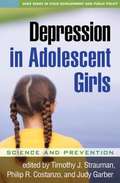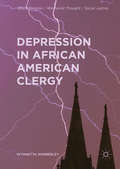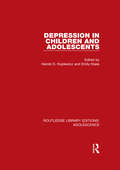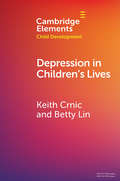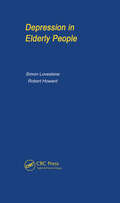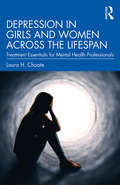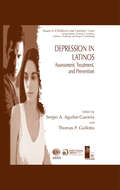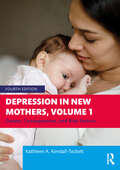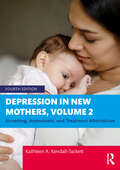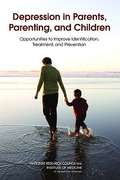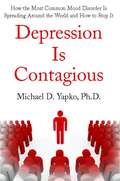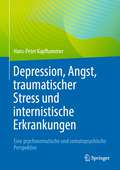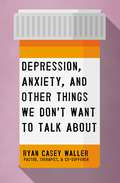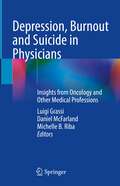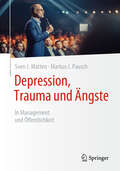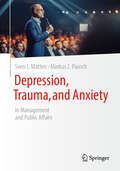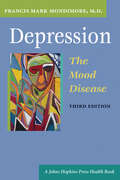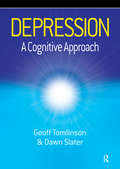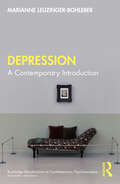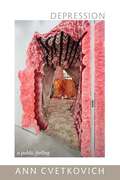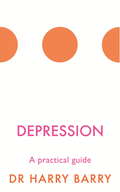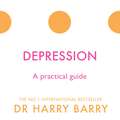- Table View
- List View
Depression in Adolescent Girls
by Philip Costanzo Timothy StraumanCompared to boys, adolescent girls face an increased risk of depression and repeated recurrences throughout adulthood. This unique volume presents a comprehensive multidisciplinary framework for understanding how girls become vulnerable to mood disorders and how that vulnerability might be reduced. The contributors are leading scholars at the cutting edge of theory, research, intervention, and policy. The chapters cover new developments in the science of depression from genes to biological, psychological, and social processes and explore how the research is being translated into innovative prevention efforts.
Depression in African American Clergy (Black Religion/Womanist Thought/Social Justice)
by Wynnetta WimberleyIn this book Wynnetta Wimberley addresses the often overlooked crisis of depression in African American clergy, investigating the causes underlying this phenomenon while discussing possible productive paths forward. Historically, many African American pastors have had to assume multiple roles in order to meet the needs of congregants impacted by societal oppression. Due to the monumental significance of the preacher in the African American religious tradition, there exists a type of ‘cultural sacramentalization’ of the Black preacher, which sets clergy up for failure by fostering isolation, highly internalized and external expectations, and a loss of self-awareness. Utilizing Donald Winnicott’s theory of the ‘true’ and ‘false’ self, Wimberley examines how depression can emerge from this psycho-socio-theological conflict. When pastors are depressed, they are more prone to encounter difficulties in their personal and professional relationships. Drawing from a communal-contextual model of pastoral theology, this text offers a therapeutically sensitive response to African American clergy suffering with depression.
Depression in Children and Adolescents (Routledge Library Editions: Adolescence #Vol. 6)
by Harold S. Koplewicz Emily KlassOriginally published in 1993, this title has contributions from many internationally respected experts from this field. The book covers the following areas: theories of development and etiology of depression; medical illness and depression; depression and other psychiatric conditions; treatment approaches to depression. The book has been written in such a way that research, clinical and psychiatric issues are easily understood. It will still be of interest and value to paediatricians, mental health practitioners and researchers in the field.
Depression in Children's Lives (Elements in Child Development)
by Keith Crnic Betty LinAlthough childhood depressive disorders are relatively rare, the experience of depression in children's lives is not. Developmental contextual perspectives denote the importance of considering both depressive disorder and the experience of subclinical depressive symptoms in the child and the family to fully understand the implications of depressive experience for children's developmental well-being. This Element draws on basic emotion development and developmental psychopathology perspectives to address the nature of depressive experience in childhood, both symptoms and disorder, focusing on seminal and recent research that details critical issues regarding its phenomenology, epidemiology, continuity, etiology, consequences, and interventions to ameliorate the developmental challenges inherent in the experience. These issues are addressed within the context of the child's own experience and from the perspective of parent depression as a critical context that influences children's developmental well-being. Conclusions include suggestions for new directions in research on children's lives that focus on more systemic processes.
Depression in Elderly People - pocketbook
by Robert HowardThis book provides information about depression in the elderly to the staff in outpatient services and gives valuable advice for identification, diagnosis and treatment of the disorder. It is useful for general practitioners and other workers in the front line of medical care.
Depression in Girls and Women Across the Lifespan: Treatment Essentials for Mental Health Professionals
by Laura H. ChoateDepression in Girls and Women Across the Lifespan takes a broad biopsychosocial approach to understanding the onset and experience of depression in women. The book is structured around four major life transitions: depression during puberty and the transition to adolescence; Premenstrual Dysphoric Disorder and a woman’s transition through monthly cycles of depression; depression during pregnancy, postpartum, and the transition to motherhood; and depression during perimenopause and the transition to menopause. Integrating cutting-edge research with a wealth of case examples and specific evidence-based interventions, the book expands our understanding of depression by taking into account the biological realities, psychological vulnerabilities, life stressors, and gendered cultural messages and expectations that intersect to shape the onset of depression in women’s lives. Written in a clear, applicable style, Depression in Girls and Women Across the Lifespan enables mental health professionals to provide effective, gender-informed, depression-focused treatments that are tailored to girls’ and women’s unique needs.
Depression in Japan: Psychiatric Cures for a Society in Distress
by Junko KitanakaSince the 1990s, suicide in recession-plagued Japan has soared, and rates of depression have both increased and received greater public attention. In a nation that has traditionally been uncomfortable addressing mental illness, what factors have allowed for the rising medicalization of depression and suicide? Investigating these profound changes from historical, clinical, and sociolegal perspectives, Depression in Japan explores how depression has become a national disease and entered the Japanese lexicon, how psychiatry has responded to the nation's ailing social order, and how, in a remarkable transformation, psychiatry has overcome the longstanding resistance to its intrusion in Japanese life. Questioning claims made by Japanese psychiatrists that depression hardly existed in premodern Japan, Junko Kitanaka shows that Japanese medicine did indeed have a language for talking about depression which was conceived of as an illness where psychological suffering was intimately connected to physiological and social distress. The author looks at how Japanese psychiatrists now use the discourse of depression to persuade patients that they are victims of biological and social forces beyond their control; analyzes how this language has been adopted in legal discourse surrounding "overwork suicide"; and considers how, in contrast to the West, this language curiously emphasizes the suffering of men rather than women. Examining patients' narratives, Kitanaka demonstrates how psychiatry constructs a gendering of depression, one that is closely tied to local politics and questions of legitimate social suffering. Drawing upon extensive research in psychiatric institutions in Tokyo and the surrounding region, Depression in Japan uncovers the emergence of psychiatry as a force for social transformation in Japan.
Depression in Latinos
by Thomas P. Gullotta Sergio A. Aguilar-GaxiolaDepression ranks as a leading mental health problem among Hispanic immigrants and their US-born children. And a wide array of issues - starting with the widespread stereotype of the "illegal immigrant" - makes the Latino experience of this condition differ from that of any other group. Depression in Latinos consolidates the conceptual, diagnostic, and clinical knowledge based on this salient topic, providing coverage from prevalence to prevention, from efficient screening to effective interventions. In this concise yet comprehensive volume, leading clinicians, researchers, and academics offer extensive research and clinical findings, literature reviews (e.g., an in-depth chapter on the Mexican American Prevalence and Services Survey), and insights gathered from first-hand experience in clinical practice. Perceptive information is offered on the most urgent and complex issues on depression in this diverse and dynamic population, including: (1) The impact language, culture, and societal factors have on depression and its diagnosis. (2) The most relevant assessment instruments. (3) How depression manifests among Latino children, youth, and seniors as well as in Latinas. (4) The relationship between depression and substance abuse. (5) The most effective evidence-based treatment methods. (6) The efficacy of interventions for depression at the community level. Depression in Latinos is vital reading for clinicians, counseling and school psychologists, psychiatrists, clinical social workers, and public health professionals interested in providing their Hispanic clients with the most effective treatment possible. In addition, its coverage of the broader issues of access to care makes this volume essential reading for mental health administrators, volunteer/outreach agencies, and policymakers.
Depression in New Mothers, Volume 1: Causes, Consequences, and Risk Factors
by Kathleen A. Kendall-TackettDepression in New Mothers, Volume 1: Causes, Consequences, and Risk Factors provides a comprehensive, evidence-based approach to understanding symptoms and risk factors of depression, anxiety, and posttraumatic stress disorder (PTSD) in perinatal women, which are common complications of childbirth. To effectively intervene, health professionals must be aware of these conditions and ready to identify them in mothers they see. Written by a psychologist and International Board–Certified Lactation Consultant, this fourth edition is expanded into two complementary volumes: the first focuses on causes and consequences of poor perinatal mental health, and the second, on screening and treatment. This volume integrates recent research on: Feeding methods and sleep location for mother–infant sleep Traumatic birth experiences Infant temperament, illness, and prematurity Violence, discrimination, and adversity The dysphoric milk-ejection reflex (D-MER) COVID-19, military sexual trauma, immigration/refugee status, and the impact of war, displacement, and terrorist attacks Depression in New Mothers, Volume 1 includes mothers’ stories throughout, which provide examples of principles described in studies. Each chapter highlights key research findings and clinical takeaways. It is an essential resource for all healthcare practitioners working with mothers in the perinatal period, including nurses, midwives, doctors, lactation consultants, and psychologists.
Depression in New Mothers, Volume 2: Screening, Assessment, and Treatment Alternatives
by Kathleen A. Kendall-TackettThis fourth edition of Depression in New Mothers, Volume 2: Screening, Assessment, and Treatment Alternatives provides a comprehensive and evidence-based approach to understanding the assessment for treatment and treatment of postpartum depression.Depression, anxiety, and posttraumatic stress disorder are common complications of childbirth that result in adverse health outcomes for both mother and child. It is vital, therefore, that health professionals be ready to help women with these conditions in the perinatal period. Written by a psychologist and board-certified lactation consultant, this fourth edition is greatly expanded and available as two complementary volumes. Focusing on causes and consequences of poor perinatal mental health and its treatment. It can also be used by community organizations that want to support new mothers, screen for possible depression, discuss treatment options, and refer them to appropriate care. This volume integrates current international research and includes chapters on:● Choosing an assessment scale to measure depression and co-occurring conditions● Developing a treatment plan● Supporting new mothers and families through community interventions● Using complementary and integrative therapies● Providing evidence-based psychotherapy● Using antidepressantsDepression in New Mothers, Volume 2 (4th Edition) includes case illustrations throughout and retains its focus on moving research into practice. It is an essential resource for all healthcare practitioners working with mothers in the perinatal period, including mental health providers, nurses, midwives, doctors, lactation consultants, and peer supporters.
Depression in Parents, Parenting, and Children: Opportunities to Improve Identification, Treatment, and Prevention
by Institute of MedicineDepression is a widespread condition affecting approximately 7.5 million parents in the U.S. each year and may be putting at least 15 million children at risk for adverse health outcomes. Based on evidentiary studies, major depression in either parent can interfere with parenting quality and increase the risk of children developing mental, behavioral and social problems. Depression in Parents, Parenting, and Children highlights disparities in the prevalence, identification, treatment, and prevention of parental depression among different sociodemographic populations. It also outlines strategies for effective intervention and identifies the need for a more interdisciplinary approach that takes biological, psychological, behavioral, interpersonal, and social contexts into consideration. A major challenge to the effective management of parental depression is developing a treatment and prevention strategy that can be introduced within a two-generation framework, conducive for parents and their children. Thus far, both the federal and state response to the problem has been fragmented, poorly funded, and lacking proper oversight. This study examines options for widespread implementation of best practices as well as strategies that can be effective in diverse service settings for diverse populations of children and their families. The delivery of adequate screening and successful detection and treatment of a depressive illness and prevention of its effects on parenting and the health of children is a formidable challenge to modern health care systems. This study offers seven solid recommendations designed to increase awareness about and remove barriers to care for both the depressed adult and prevention of effects in the child. The report will be of particular interest to federal health officers, mental and behavioral health providers in diverse parts of health care delivery systems, health policy staff, state legislators, and the general public.
Depression in Primary Care
by Simon Gilbody Peter BowerAlthough depression is a major cause of illness and disability, the quality of care offered is often poor. Research evidence demonstrating how the quality of primary care can be improved is dispersed in different academic journals and written in technical jargon. Depression in Primary Care: Evidence and Practice summarizes this research in a clear and useable format. This collection of high quality reviews of research evidence takes the form of a series of clinical and economic evaluations. Each provides a clear summary of the best evidence from trials and an accessible 'how to do it' guide, written by international experts. Global approaches towards the organization and delivery of primary care for depression are presented, from the UK, North America, Europe and the developing world. An important source of practical guidance about how to implement quality improvement programs in clinical practice, this book will assist practitioners, researchers and policy makers alike.
Depression is Contagious
by Michael D. YapkoDepression is the world's most common mood disorder, and it's spreading fast: at the current rate, the World Health Organization predicts it will leap from the fourth to the second greatest cause of human suffering and disability in the world by the year 2020. And the shocking spread of this debilitatingdisorder isn't fated by brain chemistry, genes, diet, or personal weakness, as we're too often taught -- rather, the latest research provides overwhelmingevidence that depression is far more a social problem than a medical disease. Depression doesn't just infect a single individual and then stay contained within him or her. Depression's effects reach into the interactions you have with others, rippling destructively through marriages, families, work environments, and communities like a viral contagion. Drugs can't repair or protect your relationship from depression, but the skills expert psychologist Dr. Michael D. Yapko teaches us in this powerful book can. Dr. Yapko has identified the types of relationship patterns that lead to negative ways of thinking, feeling, and relating to others and culls from the latest findings in neuroscience, social psychology, epidemiology, and genetics to provide a practical, proven plan for developing the skills and insights you need to forge stronger, healthier social connections -- and enjoy an enriching, interconnected life. While commonly prescribed drugs address some of depression's symptoms, they cannot change the social factors that cause and perpetuate the disorder. Indeed, by treat-ing a social condition as though it's a disease, the problems compound rather than diminish. The foundation for recovery is to build a healthy social life based on understanding what to expect from our relationships, what we should give, and how to relate to and accept others -- skills that have been neglected by modern society. Dr. Yapko's groundbreaking plan of action -- filled with skill-building emotional and mental exercises, anecdotes, and illuminating explanations -- shows how to:* Think about depression in realistic ways that actually empower you to overcome it. * Readjust your expectations of others so that you can accurately assess people and situations to avoid disappointment. * Get off the merry-go-round of repetitive, anxious, and depressing thoughts. * Interact with others without spreading negativity, or absorbing theirs, even when you think you can't. * Develop motivating perspectives about your relationships in order to improve them. * Reduce your children's vulnerability to depression. * Build close and enduring relationships that support and fulfill you. Provocative and groundbreaking,Depression Is Contagiousis a complete path of recovery through people, not pills. Youcannurture the relationships that will lift you -- and those around you -- out of depression. This empowering prescription for hope and healing shows how.
Depression, Angst und traumatischer Stress in der Chirurgie: Eine psychosomatische und somatopsychische Perspektive
by Hans-Peter KapfhammerDieses Buch schließt unmittelbar an das „Vorgängerprojekt“ Depression, Angst, traumatischer Stress und internistische Erkrankungen (ISBN 978-3-662-65872-7) an. Ein allgemeiner Einführungsteil stellt das tragende Konzept der somatischen und psychischen Komorbidität dar und unterstreicht einen engen Zusammenhang von körperlichen Krankheiten, medizinischen, hier chirurgischen und anästhesistischen Interventionen und koexistenten depressiven, ängstlichen und (post-)traumatischen Störungen. In einem anschließenden Teil wird dieser biopsychosoziale Fokus dann auf allgemeine Aspekte von Interventionen in Chirurgie und Anästhesie in den prä-, intra- und postoperativen Abschnitten gerichtet. Diese Aspekte werden an den häufigsten Operationen in der Allgemeinchirurgie und Orthopädie veranschaulicht. Das Thema einer affektiven und Stress-bezogenen Komorbidität wird nachfolgend in einzelnen chirurgischen Spezialkontexten erneut aufgenommen, so in der Trauma- und Unfallchirurgie, der Herzchirurgie, der onkologischen Chirurgie, der Adipositaschirurgie sowie der Transplantationschirurgie. Das Buch richtet sich gleichermaßen an Kolleg*innen aus Psychiatrie, Psychosomatik, Psychotherapie und klinischer Psychologie wie auch an Kolleg*innen aus den medizinischen insbesondere den chirurgischen und anästhesistischen Fächern. Es ist auch für alle Personen von Interesse, die sich zu den komplexen psychosomatischen und somatopsychischen Themen in der Chirurgie und Anästhesie orientieren oder mit ihnen näher befassen wollen.
Depression, Angst, traumatischer Stress und internistische Erkrankungen: Eine psychosomatische und somatopsychische Perspektive
by Hans-Peter KapfhammerKörperliche Erkrankungen gehen in ihrem Verlauf mit einer hohen psychischen Komorbidität einher. Vor allem eine koexistente Depression und Angst, ein chronischer oder traumatischer Stress üben einen relevanten negativen Einfluss auf das dynamische Krankheitsgeschehen aus. Sie sind nicht nur häufig mit einer erhöhten Morbidität, einer ungünstigeren Lebensqualität und belasteten psychosozialen Integration assoziiert. Sie sind oft auch mit einem erhöhten Mortalitätsrisiko und einem bedenkenswerten Suizidrisiko verbunden. Depression, Angst, chronischer und posttraumatischer Stress können auch die Entwicklung von körperlichen Krankheiten beeinflussen, indem sie allgemeine somatische Krankheitsrisiken vermitteln. Sowohl eine psycho-somatische als auch ein somato-psychische Perspektive ist notwendig, um die komplexen Interaktionen zwischen psychologischer, psychosozialer und biologischer Ebene zu erfassen. Ein allgemeiner Teil nimmt das Thema von psychischer und somatischer Komorbidität in einer bidirektionalen Wirkrichtung auf. Er befasst sich mit theoretischen Konzepten und empirischen Befunden zu möglichen Beziehungen zwischen somatischer Krankheit und medizinischer Behandlungsmodalität einerseits und psychischer Vulnerabilität und Störung andererseits, die traditionellerweise einer „psychosomatischen Perspektive“ in der Medizin zugeordnet werden. In einem speziellen Teil werden diese allgemeinen Aspekte einer biopsychosozialen Betrachtung von Depression, Angst und traumatischem Stress in ihrem potentiellen Einfluss auf definierte internistische Krankheitsrisiken bzw. von koexistenter depressiver, Angst- und posttraumatischer Belastungsstörung bei internistischen Erkrankungen in ihren möglichen Auswirkungen auf Krankheitsdynamik und Krankheitsverlauf jeweils nach traditionellen Organsystemen bzw. nach speziellen medizinischen Behandlungskontexten je gesondert dargestellt. Dieses umfangreiche Werk richtet sich gleichermaßen an die Kolleg*innen aus Psychiatrie und Psychotherapie wie aus den medizinischen Fächern, sowie an alle Leser*innen, die an einer psychosomatischen und somatopsychischen Perspektive auf die komplexen wechselseitigen Beziehungen zwischen psychischen Störungen und körperlichen Krankheiten interessiert sind.
Depression, Anxiety, and Other Things We Don't Want to Talk About
by Ryan Casey WallerMental illness loves to tell lies. One of those lies is that you really should be able to manage what you're struggling with. Pastor and psychotherapist Ryan Casey Waller says no. Mental health issues are not a symptom of a spiritual failing or insufficient faith; rather, suffering is the very thing our Savior seeks to heal as he leads us toward restoration. And yet, as Waller has experienced personally, the battle can be lonely and discouraging. But it doesn't have to be.Combining practical theology, clinical insights, and deep empathy, Waller offers a rare mix of companionship and truth, inviting us tohave shame-free conversations about mental health;discover why self-knowledge is so important to a deep relationship with God;understand the intersection of biology, psychology, and spirituality;explore varying avenues of healing in community, therapy, and medication; andbe equipped to support loved ones while practicing self-care.Waller bridges the gap between the spiritual and the psychological in this empathetic, imminently helpful guidebook, reminding us all that we are not alone. Hope starts now.
Depression, Burnout and Suicide in Physicians: Insights from Oncology and Other Medical Professions
by Luigi Grassi Michelle B. Riba Daniel McFarlandThis book provides a reference and contextual basis for depression, burnout and suicide among oncology and other medical professionals. Oncology as a medical subspecialty is at a unique apex of this crisis. While the same pressures in medicine certainly apply to oncologists, oncology is particularly stressful as a changing field with diverse patient and societal expectations for outcomes. In addition to experiencing the stress of caring for patients that could succumb to their cancer diagnoses, these professionals are regularly confronted with an onslaught of new medical information and a landscape that is changing at a breakneck pace. These are just a few factors involved in the increasing rates of burnout among oncologists as well as other medcial professionals. By addressing a gap in identifying mental health problems among health care professionals, this book sheds light on mental health problems and suicide among physicians. Importantly, this book is a call to action of the professional and administrative organizations to work on improving mental health of physicians. Anxiety and depression affect not only the individual doctor but also patient care. Given the increasing attention to these issues along with limited yet applicable data regarding how to address these issues, the text aims to bring the latest data face to face with consensus opinion and can be used to ultimately enhance oncologic and psychiatric practices. Written by experts in the field, Depression, Burnout and Suicide in Physicians: Insights from Oncology and Other Medical Professions aims to significantly increase awareness and contribute to understanding the necessity of preventive measures on individual, family, and care givers levels.
Depression, Trauma und Ängste: In Management und Öffentlichkeit
by Markus J. Pausch Sven J. MattenDer von den Autoren verwendete Sammelbegriff „Stress-Spektrumstörung“ erläutert wesentliche ursächliche determinierende und aufrechterhaltende Faktoren, sowie Beschwerden von körperlichen und psychischen Überlastungsreaktionen. Es werden konkrete Handlungsempfehlungen für jene dargestellt, welche unter Beschwerden oder bereits psychischen Diagnosen leiden. Dies mit besonderem Fokus auf in der Öffentlichkeit stehenden Personen wie etwa Manager oder Vorstände. Ausgang für das Erklärungs-, Bedingungs-, Störungs- und Aufrechterhaltungsmodell sind hierbei zum einen phylogenetische Schemata von Menschen ganz allgemein, sowie individuelle biographiespezifische. Ergänzend zur Erläuterung der Störungsmodelle werden konkrete Hilfestellungen gegeben, seien es nun phylogenetisch-menschliche, oder individuell-biographische.
Depression, Trauma, and Anxiety: In Management and Public Affairs
by Markus J. Pausch Sven J. MattenThe collective term used by the authors, "stress spectrum disorder", explains the major causal factors that determine and maintain symptoms of physical and psychological overload. Specific recommendations are given for those who suffer from symptoms or have already been diagnosed with a psychological disorder. Special attention is given to people in the public eye, such as managers or executives. The explanatory, conditional, disorder and maintenance model is based on phylogenetic patterns of people in general as well as individual biography-specific patterns. In addition to the explanation of the disorder models, concrete assistance is provided, be it phylogenetic-human or individual-biographical.
Depression, the Mood Disease: The Mood Disease (A Johns Hopkins Press Health Book)
by Francis Mark MondimoreDepression is a mood disorder that affects one in ten Americans in any given year. At one time too stigmatized to be mentioned in polite conversation, depression is now discussed frankly in the media, and advertisements for drug therapy appear everywhere. The third edition of this widely acclaimed book reflects changes in how mood disorders are thought about, and how they are treated. Dr. Francis Mark Mondimore, author of the best-selling book Bipolar Disorder: A Guide for Patients and Families, here explains depression—its causes and symptoms, and its treatment. He discusses depression in all age groups and in both sexes, as well as bipolar disorder, seasonal affective disorders, and depression that accompanies illness. This edition encompasses more than a decade of new research, advances in pharmacology, and changes in public perception. The past ten years have seen the release of new forms of the major antidepressants as well as other promising new avenues in pharmaceutical treatments. For example "atypical" or "second generation" antidepressants, such as venlafaxine and duloxetine, provide different ways of manipulating the chemical systems in the brain concerned with mood. And there have been significant advances in the use of MAO inhibitors, now available in patch form. Dr. Mondimore reviews these and other pharmacological therapies as part of a comprehensive approach to treatment that includes psychotherapy, family and community support, and lifestyle changes. Full of information compassionately presented, this guide provides hope and help to patients and their families.
Depression: A Cognitive Approach
by Geoff Tomlinson Dawn SlaterBased on cognitive behavioural psychotherapy, this resource book describes how to treat mild to moderate depression. Aimed at the professional with little or no experience of treating depression, it provides detailed instructions on recognising a client's profile of depression, identifying dysfunctional thinking patterns and following through the ten steps for treatment. The methods described can be used with clients exhibiting mild to moderate depression in most therapeutic situations and also for people suffering from severe depression if they are in an in-patient setting. This book is divided into three parts. Part 1 contains basic information about depression, cognitive therapy and other approaches to treatment; Part 2 gives practical guidance in 10 steps to help clients overcome depression; and Part 3 provides additional information about sub-types of depression, drug treatment and the management of suicide and self-harm. Each step has handouts that can be photocopied and given to the client. It is suitable for use with groups as well as individuals.
Depression: A Contemporary Introduction (Routledge Introductions to Contemporary Psychoanalysis)
by Marianne Leuzinger-BohleberThis book serves as a practical and comprehensive introduction to depression and its deep roots in trauma.Marianne Leuzinger-Bohleber looks at the heterogeneous and complex phenomenon of depression and considers a range of topics essential to those faced with the challenge posed by the illness. Throughout the chapters, Leuzinger-Bohleber looks at the central experience of powerlessness and helplessness, the impact of trauma and transgenerational transmission, as well as clinical research and medical intervention. Throughout, she reviews and explains up-to-date clinical research findings and guides the reader on how to apply these in a clinical setting across a wide range of aspects within the psychodynamic understanding of depression.Including a review of both classical psychoanalytic texts and state-of-the-art empirical research, this introductory book is an invaluable resource for psychoanalysts and psychotherapists in private practice and Public Health institutions alike. The clear and accessible style also make it a vital resource for students of clinical psychology, medicine, anthropology, cultural studies, the educational sciences, and beyond.
Depression: A Public Feeling (E-duke Books Scholarly Collection)
by Ann CvetkovichIn Depression: A Public Feeling, Ann Cvetkovich combines memoir and critical essay in search of ways of writing about depression as a cultural and political phenomenon that offer alternatives to medical models. She describes her own experience of the professional pressures, creative anxiety, and political hopelessness that led to intellectual blockage while she was finishing her dissertation and writing her first book. Building on the insights of the memoir, in the critical essay she considers the idea that feeling bad constitutes the lived experience of neoliberal capitalism.Cvetkovich draws on an unusual archive, including accounts of early Christian acedia and spiritual despair, texts connecting the histories of slavery and colonialism with their violent present-day legacies, and utopian spaces created from lesbian feminist practices of crafting. She herself seeks to craft a queer cultural analysis that accounts for depression as a historical category, a felt experience, and a point of entry into discussions about theory, contemporary culture, and everyday life. Depression: A Public Feeling suggests that utopian visions can reside in daily habits and practices, such as writing and yoga, and it highlights the centrality of somatic and felt experience to political activism and social transformation.
Depression: A practical guide (The Flag Series #2)
by Dr Harry Barry'If I were to recommend just one book to read on depression, it would be this' SUNDAY INDEPENDENTA practical, four step programme to help you understand and cope with depression. As many as 1 in 4 British people have depression at any one time, and despite being so prevalent in our lives and communities, there is still lingering reluctance to talk about depression and its effects. In Depression: A practical guide, Dr Barry is determined to break the silence and provide practical advice to those suffering from depression as well as their families and friends. Dr Barry reveals a simple, four step programme to deal with depression, from beginning the journey, how to feel better, how to get better and how to stay well. He explores holistic approaches involving lifestyle as well as drug therapy, talk therapy (particularly CBT) and mindfulness.Previously published as Flagging Depression, this edition has been fully revised and updated.
Depression: A practical guide (The Flag Series #8)
by Dr Harry Barry'If I were to recommend just one book to read on depression, it would be this' SUNDAY INDEPENDENTA practical, four step programme to help you understand and cope with depression.As many as 1 in 4 British people have depression at any one time, and despite being so prevalent in our lives and communities, there is still lingering reluctance to talk about depression and its effects. In Depression: A practical guide, Dr Barry is determined to break the silence and provide practical advice to those suffering from depression as well as their families and friends. Dr Barry reveals a simple, four step programme to deal with depression, from beginning the journey, how to feel better, how to get better and how to stay well. He explores holistic approaches involving lifestyle as well as drug therapy, talk therapy (particularly CBT) and mindfulness.Previously published as Flagging Depression, this edition has been fully revised and updated.Written and Read by Dr Harry Barry(p) Orion Publishing Group 2018
